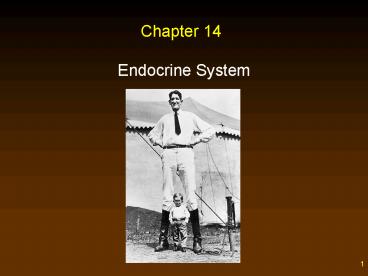Endocrine System - PowerPoint PPT Presentation
1 / 39
Title:
Endocrine System
Description:
Too much GH produced as an adult may lead to acromegaly. 11. Pituitary gigantism and dwarfism ... Acromegaly. hypersecretion of growth hormone in adulthood. 13 ... – PowerPoint PPT presentation
Number of Views:77
Avg rating:3.0/5.0
Title: Endocrine System
1
Chapter 14
- Endocrine System
2
Outline
- Endocrine Glands
- Hypothalamus and Pituitary
- Posterior vs. Anterior
- Thyroid Gland
- Parathyroid Glands
- Adrenal Glands
- Pancreas
- Other Endocrine Glands
- Homeostasis
3
Endocrine Glands
- ductless glands and tissues that secrete hormones
directly into the bloodstream - Hormone secretion by an endocrine gland is often
controlled by negative feedback - Actions of a hormone can also be controlled by an
antagonistic hormone
4
The Endocrine System
5
Hypothalamus Neuroendocrine junction
- regulates homeostasis by controlling two systems
- the autonomic nervous system
- the endocrine system via control of the pituitary
gland
6
Hypothalamic Pituitary
7
Pituitary Gland
- Anterior Pituitary
- makes its own hormones
- hypothalamus controls their secretion with
releasing/inhibiting hormones
- Posterior Pituitary
- hormones made in hypothalamus
- hypothalamus controls their secretion via nerve
impulses
8
Posterior Pituitary
- releases two hormones produced by the
hypothalamus - Antidiuretic hormone (ADH)
- Causes water reabsorption
- Negative feedback control
- Oxytocin
- Causes uterine contraction during childbirth and
milk letdown - Positive feedback control
9
Anterior Pituitary
- controlled by hypothalamic-releasing and
-inhibiting hormones - Secretes
- Thyroid Stimulating Hormone (TSH).
- Adrenocorticotropic Hormone (ACTH).
- Gonadotropic Hormones (FSH and LH).
- Prolactin (PRL).
- Melanocyte-Stimulating Hormone (MSH).
- Growth Hormone (GH).
10
Effects of Growth Hormone
- Growth hormone is produced in greater quantities
during childhood and adolescence - Too little GH produced during childhood may lead
to pituitary dwarfism - Too much GH produced during childhood may lead to
gigantism - Too much GH produced as an adult may lead to
acromegaly
11
Pituitary gigantism and dwarfism
- hypersecretion in childhood gigantism
- hyposecretion in childhood drwarfism
12
Acromegaly
- hypersecretion of growth hormone in adulthood
13
Thyroid Gland
- secretes thyroxins (triiodothyronine and
thyroxine) and calcitonin - enwraps trachea
14
goiter
- enlarged thyroid due to dietary iodine deficiency
15
Cretinism
- may result if the thyroid fails to develop
properly
16
Hypothyroidism in adults
- Myxedema lethargy, weight gain, loss of hair,
low body temp., thickness and puffiness of skin
17
Hyperthyroidism in Adults
- Graves Disease (exopthalamic goiter)
hyperactivity, nervousness, irritability,
insomnia, etc.
18
Thyroid Calcitonin
- helps regulate blood calcium level
19
parathyroid glands
- secrete parathyroid hormone
- increases blood calcium
- Antagonistic action of calcitonin and parathyroid
hormone maintain blood calcium levels within
normal limits - decreases blood phosphate
20
Blood Calcium Homeostasis
21
Adrenal Glands
- consist of central adrenal medulla and peripheral
adrenal cortex
22
Adrenal Medulla
- functions as part of sympathetic division of the
autonomic nervous system - secretes epinephrine/norepinephrine during E
situations
23
Adrenal Cortex
- Mineralocorticoids regulate salt and water
balance - glucocorticoids regulate metabolism
- gonadocorticoids mostly male sex hormones
(androgens) tha stimulate libido
24
Addisons Disease
- Hyposecretion of glucocorticoids and
mineralocorticoids - dehydration, low blood pressure
25
Cushings Disease
- Hypersecretion of adrenocorticoids
- hyperglycemia, loss of muscle and bone protein,
water and salt retention
26
Pancreas
- Exocrine digestive juices
- Endocrine pancreatic islets, produces and
secretes insulin and glucagon directly into the
blood.
27
Diabetes Mellitus
- body cells are unable to take up and/or
metabolize glucose - Type I - Pancreas is not producing insulin
- Type II - Pancreas produces insulin, but the
liver and muscle cells do not respond in the
normal fashion
28
Regulation of Blood Glucose
29
Glycosuria
30
Testes
- produce androgens (testosterone)
- _at_ Puberty secondary sexual characteristics
- produce sperm
31
Ovaries
- produce estrogens and progesterone
- _at_ Puberty secondary sexual characteristics
- produce eggs
32
Steroid Abuse
33
Thymus Gland
- Secretes thymosins, aid the differentiation of
lymphocytes
34
Pineal Gland
- Secretes melatonin, involved in regulating
sleep-wake cycle
35
Hormones from Other Tissues
- Leptin
- Protein hormone produced by adipose tissue.
- Growth Factors
- Stimulate cell division and mitosis.
- Prostaglandins
- Chemical signals produced within cells from
arachidonate (fatty acid). - Act locally.
36
Chemical Signals
- Peptide hormones bind to a receptor on cell
membranes and activate an enzyme producing cyclic
AMP - Leads to enzyme cascade
- Steroid hormones enter cells and form
hormone-receptor complexes that activate DNA
(genes) leading to protein synthesis
37
Examples of Endocrine Homeostasis
- Hypothalamus produces ADH and thus regulates
blood osmolarity - Endocrine system controls secretion of
epinephrine and norepinephrine and thus controls
fight or flight responses - Controls blood calcium levels
- Muscle contraction
- Insulin encourages uptake of glucose by cells and
storage of glucose as glycogen in the liver and
muscles
38
Review
- Endocrine Glands
- Hypothalamus and Pituitary
- Posterior vs. Anterior
- Thyroid Gland
- Parathyroid Glands
- Adrenal Glands
- Pancreas
- Other Endocrine Glands
- Homeostasis
39
(No Transcript)

